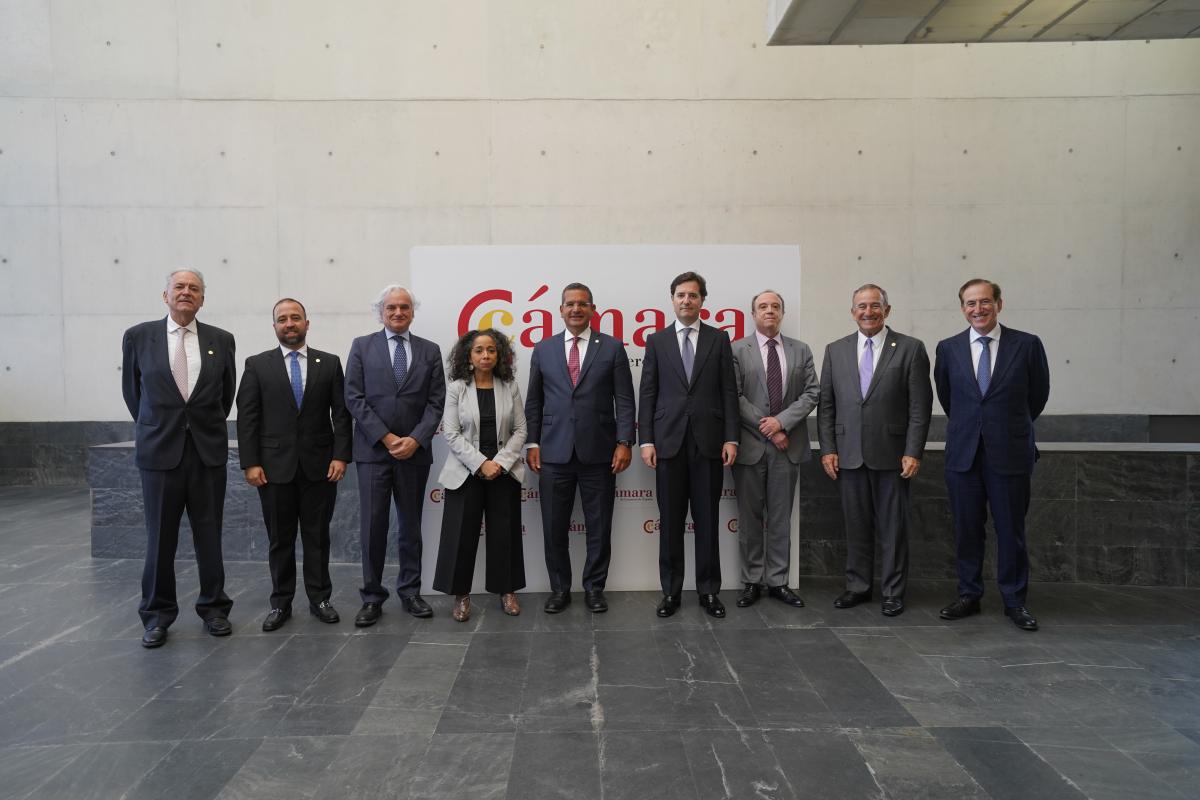The Governor of Puerto Rico highlights the potential for growth in economic relations with Spain
At the Spain-Puerto Rico Business Meeting, the opportunities that will emerge with the substantial allocation of federal funds pledged in the Repair and Reconstruction or Relocation Programme were highlighted.

The Governor of Puerto Rico, Pedro Pierluisi, highlighted the great potential for improving commercial and business relations between Spain and Puerto Rico at the business meeting organised by the Spanish Chamber of Commerce, the Secretary of State for Trade, through ICEX Spain Export and Investment, and the CEOE, which was attended by a hundred companies. “This forum opens up great opportunities. Puerto Rico has entered a new era and we are seeing marked growth, with the lowest unemployment rate in its history. We are actively seeking to boost the economic development and business environment; Puerto Rican companies are ready to export goods as well as partner with Spanish companies,” he said.
Pierluisi made reference to the “fraternity with Spain” and the “historic milestone at which they find themselves in building shared ties.” He has also pointed to the tax incentives the island offers in the tourism, STEM, and industrial sectors. “Help us build a better Puerto Rico: the benefits will be shared,” he stressed.
For her part, the US Ambassador to Spain, Julissa Reynoso, recalled as “proof of the lasting friendship,” the success of the previous trade mission from Puerto Rico to Spain in 2019, as well as the recent visit by His Majesty the King. Reynosso stressed the Biden Administration’s commitment to Puerto Rico. “I guarantee that it is a priority for this administration,” the ambassador stressed, while pointing out its importance as a “platform” for business.
Adolfo Díaz-Ambrona, the Secretary General of the Spanish Chamber of Commerce, referred to the “firm commitment to public-private partnership” and “the significant funding that will reach Puerto Rico for its recovery,” in reference to the fact that the US Federal Government has committed significant funds to improve telecommunications, transport, energy and housing infrastructure (61 billion dollars) as well as to mitigate the effects of the COVID on businesses and families (45 billion dollars). Díaz-Ambrona said that together with “the debt adjustment plan,” Puerto Rico has created “ a secure environment that makes it very attractive for companies” and concluded by stating the “prestige, recognition and soundness of Spanish companies” as “formidable travelling companions for the benefit of society as a whole.”
The Vice-President of the CEOE and President of CEIM, Miguel Garrido, said that Puerto Rico offers a very attractive environment for Spanish companies thanks to the existence of a stable and predictable legal framework, which facilitates the development of public-private partnerships. “This framework would be even better if progress were made in the negotiations to include Puerto Rico in the Double Taxation Avoidance Agreement, which was signed between the US and Spain, as it is essential to boost Spanish investment on the island,” said Garrido. He also considered the fact that the need to improve the logistics and transport infrastructure, in order to become a leading logistics centre for Central America and the Caribbean, is a priority for Spanish companies that want to benefit from their strategic position in the region.
For his part, Javier Serra, the Director General of Institutional Cooperation at ICEX, stressed the importance for both countries of working together and “leveraging the strong ties that unite them to promote a greater presence of Spanish companies in Puerto Rico and the USA, and also to encourage them to consider Spain a natural gateway to the European market.” Serra also stressed the great opportunities Puerto Rico offers “with the arrival of substantial federal funds that support the modernisation of its infrastructure, its electricity grid and are committed to renewable energies.”
The meeting was attended by senior representatives of companies from Puerto Rico and Spain. Antonio Huertas, the Chairman of Mapfre, gave a first-hand account of the company’s experience on the island and his personal reflections after living as an expatriate in Puerto Rico. Huertas recalled Puerto Rico’s “legal security, culture, and health development” and the opportunity it presents to “learn how to do business in the United States.”
There are currently around thirty Spanish companies operating in Puerto Rico, in the infrastructure, energy, engineering, insurance, publishing and agri-food sectors. Besides the ICT sector, the island also boasts a multitude of sectors of interest for Spanish companies as possible areas for expansion: perfumery and cosmetics, fashion, jewellery, accessories and ceramics for construction, as well as others connected with industrial equipment and capital goods, telecommunications, road communications and housing.
Related news
A large delegation made up of Spanish business organisations and companies took part this Monday and Tuesday, 9 and 10 September, in two high-level meetings with representatives of the Chinese business world, as part of the official visit of the President of the Government, Pedro Sánchez, to the People's Republic of China.
Even though China is our main trading partner in Asia, Spanish companies still have a long way to go to take advantage of the great business and investment opportunities offered by the Chinese market.
The Ibero-American Secretary General, Andrés Allamand; the President of the CEOE, Antonio Garamendi, and the President of the Ibero-American Arbitration Centre-CIAR, Javier Íscar, inaugurate a conference at the CEOE on Ibero-American arbitration. They stress the importance of continuing to support arbitration as an effective and safe instrument for resolving disputes in the region.
Business and investment opportunities in Medellin and the Metropolitan Area were assessed for the Spanish companies with interests in the area.






